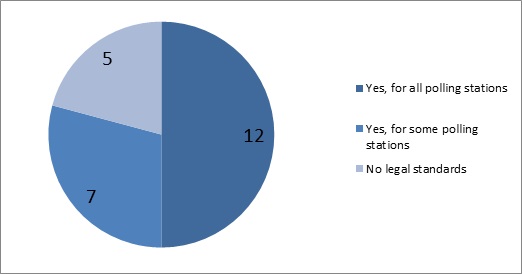Are there legal accessibility standards for polling stations?
As well as general accessibility standards covering public authority buildings, one way to ensure that persons with disabilities are able to exercise their right to vote is to establish specific legally binding accessibility standards for polling stations. To be fully accessible, polling stations need to take into account the needs of persons with different types of impairments.
Article 29 of the CRPD requires state parties to ensure that voting facilities and materials are “appropriate, accessible and easy to understand and use”. Under the theme of ‘Participation’, the European Disability Strategy (2010–2020) includes a measure on supporting Member States to ensure that people with disabilities can fully exercise their electoral rights by developing and disseminating standards on accessible election facilities.
As with the previous indicators, the existence of such a law is not essential for ensuring an accessible voting system. However, a legal requirement for polling stations to be accessible, particularly when combined with detailed guidelines setting out criteria for accessibility, can be an important sign of commitment to implement Article 29 of the CRPD.
Are there legal accessibility standards for polling stations in place in the EU Member States?

Note: those EU Member States for which no data was provided by ANED experts are excluded from this figure.
Source: Lawson, 2014
The research indicates that in 12 EU Member States, Croatia, Estonia, France, Germany, Ireland, Lithuania, Luxembourg, Malta, Portugal, Spain, Sweden and the United Kingdom, legal accessibility standards which apply to all polling stations are in place. Within this group there is, however, considerable variation in the nature and scope of the legal requirements. In Ireland and Spain, for example, legislation contains detailed accessibility requirements, with a particular focus on persons using wheelchairs and persons with visual impairments. In contrast, in Croatia, Sweden and the United Kingdom, accessibility is mentioned as one of the factors which must be taken into account by authorities in the selection of polling stations.
In a second group of Member States legislation concerning the accessibility of polling stations applies only to a certain number or proportion of polling stations. In Belgium one in five polling stations must be accessible; in Poland, one in three; and in the Netherlands, at least one in four polling stations must be “as accessible as possible” so that people with physical impairments can vote independently. Similarly, in Austria and Slovenia, electoral law requires that each municipality or voting district must have at least one accessible polling station.
In the final group of five EU Member States, the research indicates that there are no laws which explicitly require polling stations to be accessible, although polling stations can be covered by wider laws on the accessibility of public buildings.